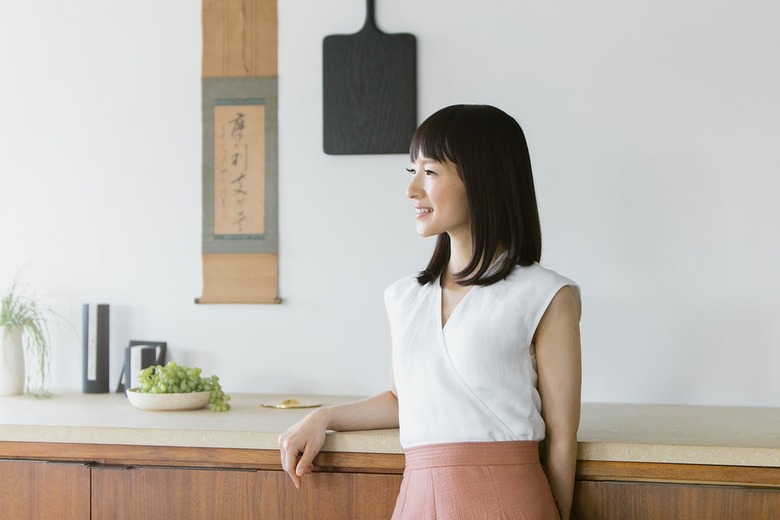I Joined A Marie Kondo KonMari Course And What I Learned Was Surprising
It's not often professional organizers become global sensations. But then again, not everyone is Marie Kondo. The Japanese tidying expert made waves with her first book, The Life-Changing Magic of Tidying Up, which was published in Japan in 2010 and the U.S. in 2014. It became a New York Times #1 bestseller, and Kondo was named one of the world's most influential people by TIME in 2015.
Her signature KonMari Method — which is both an ethos and a step-by-step guide to tidying your home — is a radical departure from the way most Americans view their things. Kondo promotes a kind of material minimalism where the main tenet is to only keep items that spark joy.
It's not a method for everyone. On the one hand, there's something incredibly liberating about getting rid of the clutter around you. On the other, there's a lot of emotional baggage that comes with sorting through your belongings. (ust look at Kondo's 2019 Netflix series Tidying Up with Marie Kondo, where she transforms the lives of American clients — plenty of tears are shed.
Of course, Kondo can't be everywhere at once to hold the hands of those tackling the intense KonMari Method. That's why she launched a consultant training program in 2016, which has since trained hundreds of disciples to go forth and spread her gospel of joy.
I was fortunate enough to sit in on this month's virtual KonMari Consultant Certification Course as a media guest, and I'll admit: It was nothing like what I expected. Here's what I discovered over the course of the three-day program.
1. The course isn't designed to teach you how to get organized yourself.
1. The course isn't designed to teach you how to get organized yourself.
If you're looking for a how-to course that explains the KonMari Method in detail, this isn't it. This is a full-fledged training program that teaches potential professional organizers how to work with clients through the KonMari Method and run their own business. In order to take the course, you must've already read Kondo's books and applied the method to your own home — and they will ask for proof. (If you are looking for a KonMari boot camp, you can enroll in this self-paced video course hosted by Kondo herself.)
Throughout the first two days of the program, consultants-in-training are educated by certified KonMari consultants in how to manage clients. They work through any issues that might arise during the application of the KonMari Method through a series of lectures, Q&As, and role-playing exercises. On the third day, it's all about learning how to run a business, from setting up payment systems to marketing your services.
2. KonMari is much, much more than tidying.
2. KonMari is much, much more than tidying.
As someone who hasn't gone through KonMari myself, I realized very quickly during the course that the method is much less of a guide to tidying the physical things inside your home — although that is a part of it — and much more about a personal, psychological shift.
On the first day of the course, the consultants-in-training are asked to contemplate the philosophy of KonMari by thinking about why they chose to embark upon the journey themselves, addressing the challenges they faced throughout the process, and what they've ultimately learned. And we're not talking about looking at successful before-and-after photos of their newly organized homes. The conversations went deep.
What happens when you realize your partner doesn't spark joy? How do you sort through a nursery after a miscarriage? How do you work with aging clients who are facing their own mortality? In some ways, the course felt like a group therapy session.
What I came to realize is that the KonMari Method is actually about creating a joyful life, not just organizing your home. And the role of the consultants is to facilitate that journey, in part through helping clients tidy up.
3. It takes a lot to become a certified KonMari consultant.
3. It takes a lot to become a certified KonMari consultant.
The network of certified KonMari consultants is pretty slim — just 509 people at the time of publication. One reason is that there have only been a handful training courses over the past five years. Until 2020, they were all held in-person — now, they've gone virtual due to the pandemic, allowing for more potential consultants to join the program than before. There were approximately 75 people from 23 countries around the world during this month's course.
The second reason is the process is no joke. While the course is the start of the journey — it costs $2,250 for virtual and $2,500 for in-person training, by the way — soon-to-be consultants must then complete practice sessions with clients and submit evidence of their work to be evaluated by the KonMari Media, Inc. (KMI) team. On average, it takes three to six months to achieve entry-level certification, though some consultants report it's taken them an entire year. (Editor's note: The company says that courses will continue virtually but that it hopes to do an in-person version at least once a year once it's safe to do so).
Throughout that process, however, consultants-in-training are provided ample support not only from KMI, but also from the larger network of consultants. In observing the training course, it was easy to feel the camaraderie between consultants — this is a tight-knit group.
Once an organizer becomes a certified KonMari consultant, they're charged $500 for "Activation" and then a $500 annual membership fee (starting the second year). Otherwise, they're pretty much free to run their business as they see fit, setting their own rates and working their own hours. And seeing as some consultants charge at least $100 per hour, it could certainly be worth the intense training process. And, you know, there's that whole changing someone's life thing, too!
As for me, I don't think I have any hope of becoming a certified KonMari consultant any time soon, but I'm still walking away from the training course with some deeper thoughts about finding joy in certain areas of my life.



